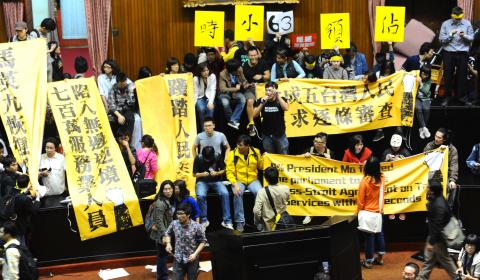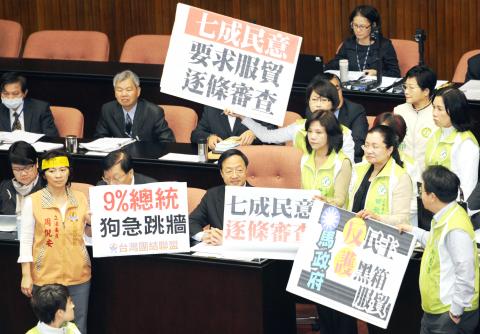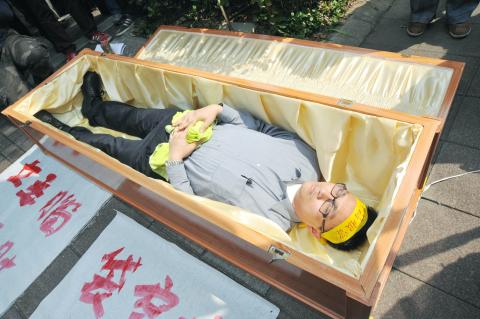Opposition parties and civic groups are working together on a full-scale protest that includes legislative boycotts, a “siege” of the legislature and street rallies after the Chinese Nationalist Party (KMT) cut short the review of the cross-strait service trade agreement on Monday and sent the pact directly to the plenary session for its second reading.
At about 9pm, more than 300 students and demonstrators broke from the rally outside the Legislative Yuan, broke into the compound and took over the podium on the legislative floor.
The police did not evacuate the protesters.

Photo: Chang Chia-ming, Taipei Times.
The protesters staged a sit-in in the assembly hall where lawmakers hold meetings, saying that they would stay there until Friday and until the KMT withdraw the agreement from the plenary.
The protesters called on supporters to bring supplies to the site.
The KMT caucus has breached a previously reached inter-party consensus that the pact — which experts said could severely affect local industries — must be reviewed clause-by-clause in the Legislative Yuan, which has infuriated the public, the opposition said, adding that the move amounted to contempt of parliament and a betrayal of democratic principles.

Photo: Lo Pei-der, Taipei Times
In response, the Democratic Progressive Party (DPP) and the Taiwan Solidarity Union (TSU) boycotted the Legislative Yuan’s plenary session yesterday, forcing Legislative Speaker Wang Jin-pyng (王金平) to announce an adjournment for party negotiations.
Opposition parties vowed to continue boycotting the plenary until the KMT retracts the agreement.
With President Ma Ying-jeou’s (馬英九) administration and the KMT showing no signs of retracting the agreement, DPP Chairman Su Tseng-chang (蘇貞昌) yesterday said the party would launch a series of “countermeasures” against the KMT over the next three days.

Photo: Mandy Cheng, AFP
The DPP said that it would propose a “better agreement” than the current service trade pact in its Central Standing Committee meeting today and convene a meeting with representatives from various industries and civic groups tomorrow to discuss the establishment of an alliance to monitor the review of the agreement.
In addition, the party plans to launch a campaign to “besiege” the Legislative Yuan.
“Our goal to review the pact clause-by-clause and to renegotiate the deal remains unchanged,” Su said.
The TSU is mobilizing its supporters and industry representatives to “besiege” the Legislative Yuan on Friday, with TSU Chairman Huang Kun-huei (黃昆輝) accusing the KMT of breaching the consensus, which Huang called unacceptable.
Speaking to reporters after the plenary session yesterday, Wang said that although the KMT’s handling of the review surprised him, he would not speculate on what the pan-blue and pan-green camps would do next week.
While another round of inter-party negotiation is needed, “the atmosphere is not appropriate for both camps to sit down and talk at this moment,” Wang said.
At separate press conferences, DPP caucus director-general Gao Jyh-peng (高志鵬) said that the party would continue boycotting plenary sessions until the KMT offers a concession, while DPP Deputy Secretary-General Lee Chun-yi (李俊毅) insisted that the agreement should stay in the committee and be reviewed line-by-line.
Former premier Frank Hsieh (謝長廷) of the DPP posted on Facebook that he supported an “all-out protest” in collaboration with the public against the KMT.
Dozens of civic group representatives and students, who have had been camping outside the Legislative Yuan since Monday, stepped up their mobilization efforts, urging the public to join the sit-in and an overnight rally to voice their opposition to what they called the KMT’s “brutal” decision that had completely ignored the interests of the Taiwanese.
DPP lawmakers Hsiao Bi-khim (蕭美琴), Wu Yi-chen (吳宜臻) and Wu Ping-jui (吳秉叡) also staged a 70-hour hunger strike, which began at noon yesterday and would last until 10am on Friday, when a plenary session is scheduled to commence.
The protest in front of the Legislative Yuan would continue until Friday, according to Lai Chung-chiang (賴中強), convener of the Democratic Front Against the Cross-strait Trade in Services Agreement and spokesperson of the rally.
Beginning yesterday morning, the police have reinforced deployment and have installed a road block around the Legislative Yuan compound to keep the protesters from entering the compound and to prepare for the planned siege on Friday.

CHAOS: Iranians took to the streets playing celebratory music after reports of Khamenei’s death on Saturday, while mourners also gathered in Tehran yesterday Iranian Supreme Leader Ayatollah Ali Khamenei was killed in a major attack on Iran launched by Israel and the US, throwing the future of the Islamic republic into doubt and raising the risk of regional instability. Iranian state television and the state-run IRNA news agency announced the 86-year-old’s death early yesterday. US President Donald Trump said it gave Iranians their “greatest chance” to “take back” their country. The announcements came after a joint US and Israeli aerial bombardment that targeted Iranian military and governmental sites. Trump said the “heavy and pinpoint bombing” would continue through the week or as long

TRUST: The KMT said it respected the US’ timing and considerations, and hoped it would continue to honor its commitments to helping Taiwan bolster its defenses and deterrence US President Donald Trump is delaying a multibillion-dollar arms sale to Taiwan to ensure his visit to Beijing is successful, a New York Times report said. The weapons sales package has stalled in the US Department of State, the report said, citing US officials it did not identify. The White House has told agencies not to push forward ahead of Trump’s meeting with Chinese President Xi Jinping (習近平), it said. The two last month held a phone call to discuss trade and geopolitical flashpoints ahead of the summit. Xi raised the Taiwan issue and urged the US to handle arms sales to

BIG SPENDERS: Foreign investors bought the most Taiwan equities since 2005, signaling confidence that an AI boom would continue to benefit chipmakers Taiwan Semiconductor Manufacturing Co’s (TSMC, 台積電) market capitalization swelled to US$2 trillion for the first time following a 4.25 percent rally in its American depositary receipts (ADR) overnight, putting the world’s biggest contract chipmaker sixth on the list of the world’s biggest companies by market capitalization, just behind Amazon.com Inc. The site CompaniesMarketcap.com ranked TSMC ahead of Saudi Aramco and Meta Platforms Inc. The Taiwanese company’s ADRs on Tuesday surged to US$385.75 on the New York Stock Exchange, as strong demand for artificial intelligence (AI) applications led to chip supply constraints and boost revenue growth to record-breaking levels. Each TSMC ADR represents

State-run CPC Corp, Taiwan (CPC, 台灣中油) yesterday said that it had confirmed on Saturday night with its liquefied natural gas (LNG) and crude oil suppliers that shipments are proceeding as scheduled and that domestic supplies remain unaffected. The CPC yesterday announced the gasoline and diesel prices will rise by NT$0.2 and NT$0.4 per liter, respectively, starting Monday, citing Middle East tensions and blizzards in the eastern United States. CPC also iterated it has been reducing the proportion of crude oil imports from the Middle East and diversifying its supply sources in the past few years in response to geopolitical risks, expanding